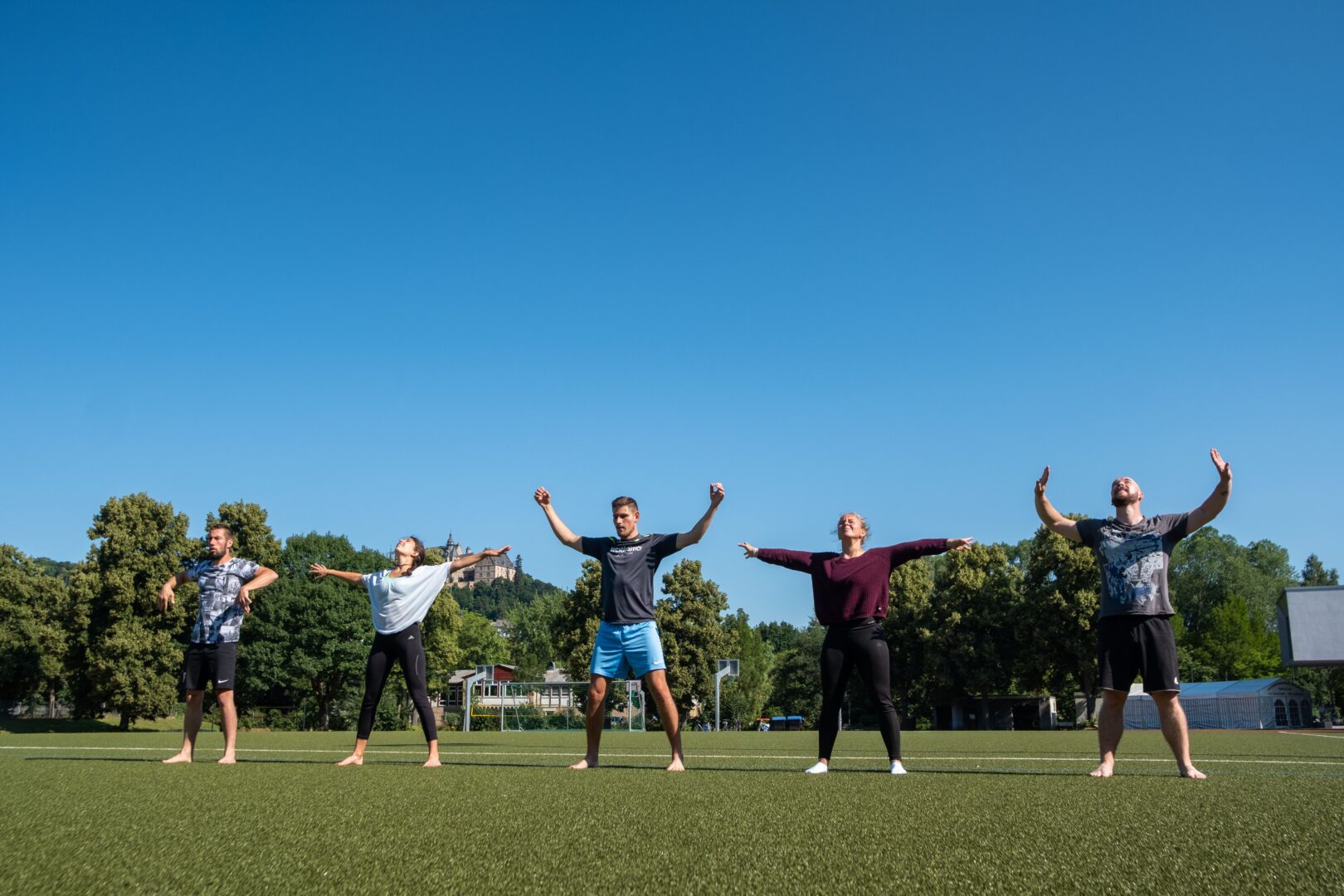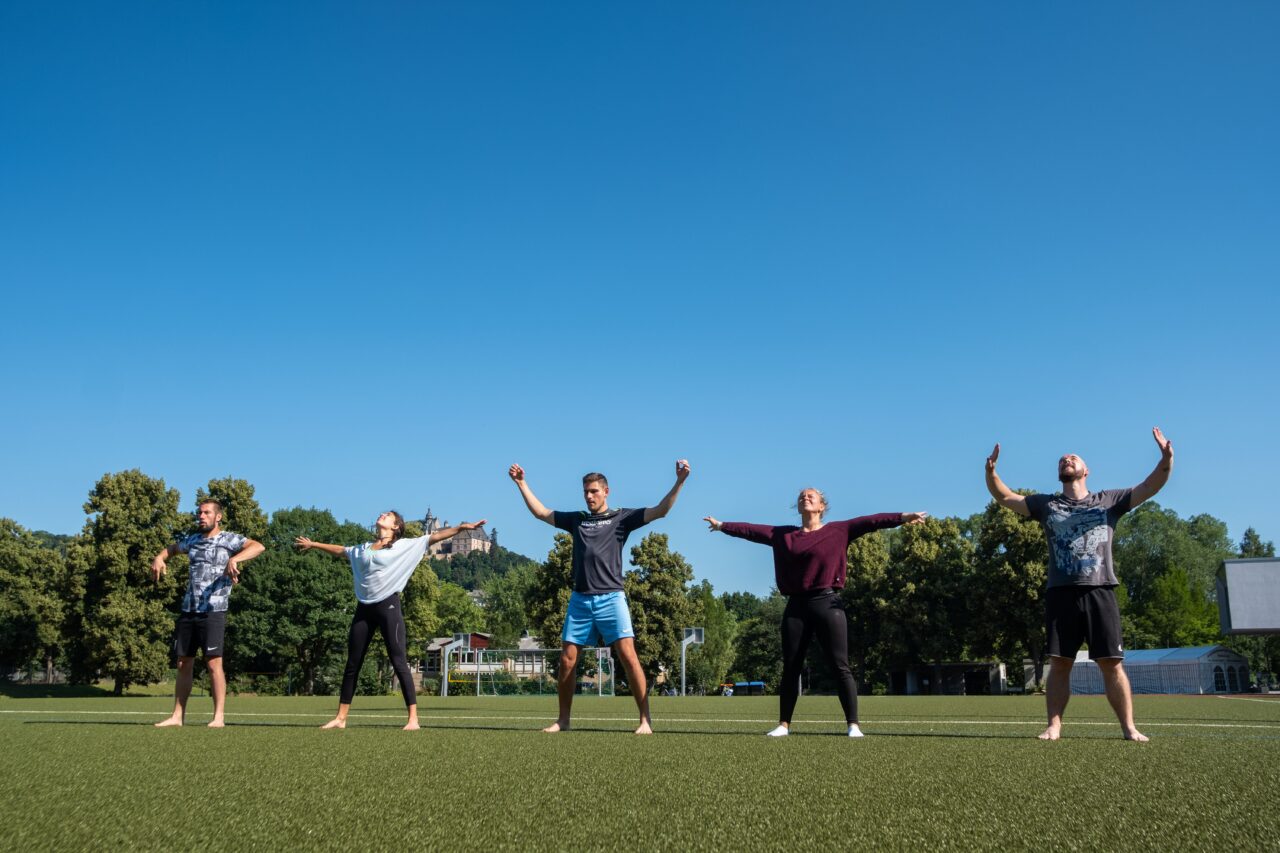Goals of the Hub
The Research Hub on Inclusive Health and Well-Being combines the strengths of the partners in the Alliance to strengthen research in the interdisciplinary field of inclusive health. The aim is to create a research space which tackles the topic of health and well-being through an inter- and transdisciplinary approach providing a complementary perspective on the topics of peace, justice, and inclusive societies. It will be achieved through promoting health and preventing diseases; understanding relevant environmental and socio-economic risk factors in the EU and in countries from where EU is sourcing goods and products (often without paying the true costs that would include the hidden impacts of economic activities on the environment, society and health); managing diseases through a better understanding and treatment of diseases; promoting health systems resilience and the just and equitable distribution of health services through dialogue; increasing the capacity to collect, integrate and interpret large amounts of data through digital solutions.
An important goal is to support the career development of ECR in the field of inclusive health and well-being and to develop and offer joint training programmes in an interdisciplinary research context. Together with relevant associated partners, dialogues are organised with decision-makers and the wider European public. The research impact conferences also serve this purpose.
The Hub’s Activities
- Mobile (blended/hybrid) interdisciplinary seminars will offer a platform to share and exchange state-of-the-art knowledge;
- Annual research impact conference: associated partners and members of the Alliance as well as actors from civil society and politics will be invited for contributions and exchange. This activity will avoid harmful fake and disinformation;
- Creative Spaces will focus on innovative and risky approaches in inclusive health and well-being studies. These will function as strongly trans-disciplinary think tanks for the development of innovative and creative ideas which will chart new research trajectories;
- Thematic workshops, panels, etc. Working sessions gathering researchers, industry and civil society will be planned to discuss specific topics;
- Innovative research-based teaching methods. The research results will flow back into teaching and eventually inform new modules or the teaching curricula in participating Universities (an advanced concept of a Master program on global health and human rights has already been developed at JLU and UNSA that could be the starting point for a joint EUPeace Master on this topic area). Masters’ students will learn state-of-the-art from EUPeace doctoral students as well as from experienced teachers; EU-Peace doctoral students will have the chance to tutor master’s students;
- Mentorship programme. Master theses will be co-reviewed by senior Alliance researchers. Master students will be required to spend a period at one of the universities belonging to the Alliance of EUPeace; outstanding thesis works will be included in the interdisciplinary mobile seminars and the annual research conferences;
- Fellowship programme. Fellowships will implement and develop the sustainability; and the capacity-building of the RH; they will promote cooperation and mobility;
- Establish an Early Career Network and an EUPeace Doctoral Network;
- Support joint research infrastructures and open lab policies.
Current Activities
Here you can find a summary of the last Research Seminar that took place on Thursday 6 March 2025 from 9am to 12pm (CET).
Contact


Speakers of the Hub
The Speaker of this hub is Lorena Pochini from the University of Calabria, Italy; Substitute Speaker is Michael Knipper from the Justus Liebig University Giessen, Germany.
Members of the Hub
The members of the Research Hub come from all alliance partners and from various research disciplines. The Research Hub members combine their scholarly strength in order to organize the above-mentioned activities. The activities themselves are however open to members of the entire EUPeace Alliance, especially members of the EUPeace Early Career and Doctoral Networks, as well as to the wider public.
| University | Research Hub Member | Research Focus |
| Marburg (UMR) | Hendrik Trescher | Incluive societies; Inclusive education; (dis)ability studies |
| Michael Börner | Inclusive societies; Early childhood studies; (dis)ability studies | |
| Thomas Brenner | Environmental impact on health; Personal characteristics and health risks; Statistical analysis | |
| Sören Becker | Healthy cities (governance and planning); Digital warning systems (innovation & devlopment); Perceptions on health and climate change | |
| Mirza Pojskic | Application of modern technologies in surgery and neurosurgery and availability in LMIC; Characteristics of health care systems in southeastern Europe and development potentials; Neurosurgical education programs for LMIC (Balkan, Africa, South America, south Asia) | |
| Hanna Christiansen | Child and adolescent mental health; Patient and public involvement; Mental health promotion in relevant life environments | |
| Mohammad Farzanegan | Sanctions and Health; Sanctions and Wellbeing; Quantitative Analyses | |
| Friedemann Voigt | Bioethics; Health and Religion; Disability Studies | |
| Boris Burghardt | International criminal law; Sexual criminal law; legal contemporary history; in particular criminal law dealing with Nazi injustice | |
| Giessen (JLU) | Michael Knipper | |
| Gudrun Keding | Food and nutrition security; Sustainable diets & food systems (in the global south); Nutrition-sensitive value chains | |
| Mathias Faßhauser | ||
| Sascha Knauf | International Animal Health; One Health; Wildlife Health | |
| Laura Gerspacher | ||
| Katrin Richter | Ion channels in immune cell function; Hyperinflammation and inflammatory pain; Non-neuronal cholinergic system | |
| Ulrike Gisch | psychological determinants of sustainable eating, weight-inclusive approaches, eating disorders and obesity | |
| Limoges (UNILIM) | Stéphane Mandigout | |
| Valeria de Luca | ||
| Marie-Hélène Cuin | ||
| Véronique Blanquet | ||
| Calabria (UNICAL) | Lorena Pochini | Transport proteins, drug interaction, diseases |
| Michele Galluccio | transport proteins in health and diseases; molecular biology; E. coli protein expression and purification | |
| Antonio Alati | ||
| Anna Lisa Palermiti | Aggressivity, Bullying, Cyberbullying, Digital citizenship | |
| Rosamaria Lappano | Tumor Microenvironment; Signal Transduction | |
| Michele Provenzano | Cardiovascular risk ; albuminuria ; chronic kidney disease | |
| Lidia Malizia | Decision support in public administration; Management Science; Organizational well-being in public administration | |
| Rina Mary Mazza | ||
| Francesco Craig | Neurodevelopmental disorders, trauma, clinical psychology | |
| Vanessa Marcella | Language variation, analysis of academic, cultural, and social discourse | |
| Lidia Malizia | Decision support in public administration; Management Science; Organizational well-being in public administration | |
| Comillas (COMILLAS) | João Nunes | Global health and planetary health; Health security and securitization of disease; Community health workers |
| Katia Hueso Kortekaas | Nature-based education; Risk pedagogy; Inclusive nature | |
| Isabel Carrero Bosch | Transformative consumer research; Sustainable consumption; Meta-analysis | |
| Carmen Valor Martínez | Transformative consumer research; Consumptions, nature and well-being; Emotions, consumption and moral behavior | |
| Raquel Redondo Palomo | ||
| Pilsen (UWB) | Václava Tlili | Sufi-based practices and mental health, Spiritual well-being in Islam, Contemplative practices in Islamic pedagogy, Sacred rhythm and emotional stillness in Sufi pedagogy, Dhikr and repetition as techniques of inner tranquillity, Rhythmic recitation and psychological grounding, Inner meanings (maʿānī) and soul tranquillity in Islamic spirituality |
| Alena Glajchová | Health inequalities; Vulnerable populations; Emotions; Migrant health; Women’s health | |
| Luděk Hynčík | Gynaecology; Biomechanical models; Injury prevention | |
| Vít Nováček | Experimental & computational biomechanics; Women’s health; Body-medical device interaction | |
| Mostar (SUM) | Anita Lalić | Food and nutrition security; Sustainable diets & food systems (in the global south); Traditional foods |
| Nevena Ćorić | ||
| Maja Pandža Topić | Mental health; Psychometrics; Dyad/Group processes | |
| Maja Mijatović | ||
| Çukurova (CU) | Burcu Avcıbay | Midwifery; Climate change and maternal/fetal / woman health; Migrant/women’s health |
| Şule Gökyıldız Sürücü | Obstetrics & gynaecology nursing; Sexual & reproductive health; Migrant/women’s health | |
| Ebru Gözüyeşil | Obstetrics & gynaecology nursing; Sexual & reproductive health; Women’s health | |
| Çağla Okyar | Medical education; Health advocacy; Disadvantaged groups | |
| Damla Kısrık | Midwifery; Climate change and maternal/fetal/ woman health; Sexual & reproductive health | |
| Kenan Ateşgöz | Health Communication; Climate Communication; Artificial Intelligence in Media and Journalism Studies | |
| Sarajevo (UNSA) | Ksenija Kondali | Cross-Cultural Analysis; Comparative Health / Global Studies Learning Programs; Intercultural Understanding |
| Aida Pilav | Public health; Health Systems; Community health; Environmental Health | |
| Nina Marković | Oral Health; Public health; Community health- community dentistry and oral epidemiology; Preventive and pediatric dentistry | |
| Tanja Dujić | Pharmacogenomics; Personalized Medicine; Drug-drug-gene interactions | |
| Anida Dudić | Youth Mental Health; Counseling and Psychotherapy; Crisis Intervention and Psychological First Aid | |
| Jasmina Đeđibegović | Food Science; Nutrition and Dietetics; Health |
The Doctoral Group Inclusive Health and Well-Being
Within the framework of the EUPeace Doctoral Network, a doctoral group has formed that aligns with the Research Hub’s interdisciplinary research field. The Doctoral Group has elected Hilal Nizamoglu (Justus Liebig University Giessen) as its speaker and Antonio Topalović (University of Sarajevo) as its co-speaker.
The members of the Doctoral Group are:
| University | Doctoral Group Member |
| Marburg (UMR) | Tabea Nauschütz |
| Helena Timmerer | |
| Peter Nothbaum | |
| Christina Hölbling | |
| Anne Vogel | |
| Giessen (JLU) | Hilal Nizamoglu Caliskan |
| Oanh Truong | |
| Limoges (UNILIM) | Poeiti ABI SAAB |
| Amadou Maguette Djiogomaye Ndiaye | |
| Calabria (UNICAL) | Antonella Buccafuri |
| Dario Delgado | |
| Enrica De Rasis | |
| Comillas (COMILLAS) | Julio Estanislao Cuc |
| Ambrose Esigbemi Umetietie | |
| Manuel Lara | |
| Carmen Valor | |
| Pilsen (UWB) | Muhammad Ali |
| Zuzana Votrubcova | |
| Mostar (SUM) | Armin Sljivo |
| Ivan Lapajne | |
| Çukurova (CU) | Fatma Gündoğan |
| Makbule Berfin Büker | |
| Çağla Okyar | |
| Ecem Karabulut | |
| Buse alis | |
| Cihad Gündüz | |
| Sezen Ateş Yaman | |
| Pinar Gürler Ağaçkıran | |
| Ayse Nur Cakir Gungor | |
| Meryem Köse | |
| Omer Kandaz | |
| Sarajevo (UNSA) | Antonio Topalović |
| Anela Hadžifejzović Trnka | |
| Emina Bečić | |
| Naida Omerović Ćorović | |
| Nikolina Tomic | |
| Belma Jusic | |
| Anita Burdžović | |
| Belma Jusic |

